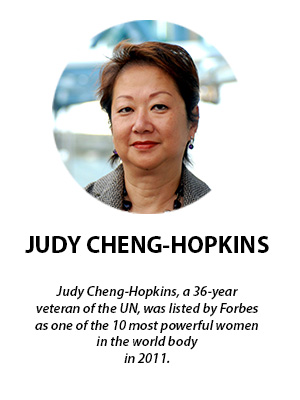
One never knows what to expect at a secondary school class reunion. Everybody is past their prime, has grey hair and are either happy or still have an axe to grind.
At my class reunion recently, I exchanged pleasantries with old friends. Then someone came up to me and said: “Oh you are the one involved in humanitarian work at the UN?”
Before I could say “yes” he retorted: “What a waste of time! Don’t you know your food is going to the terrorists and dictators? You should just let everyone die!”
What? Who was he talking about? Let grandmothers and children die? Innocent civilians caught in the crossfire of civil conflicts? Victims of natural disasters and climate change?
The reality is quite different
He continued: “You know that the dictators and leaders of these countries are just keeping the aid for themselves or using it for their own gain!”
The gross generalisations and callousness of his remarks obviously offended me, but equally insulting was his insinuation that humanitarian workers were nothing but a bunch of unprofessional, bumbling, self-righteous do-gooders, oblivious to the realities of this cruel and corrupt world.
Nothing could be further from the truth. I hope to tell the story frankly and honestly of what humanitarian work entails. Granted there always are attempts at fraud at all levels because we are talking about a precious commodity: food under circumstances where famine is a real threat.
However, to assume that humanitarian workers in NGOs and the UN have not created systems and protocols to mitigate corruption and fraud is a sign of ignorance.
By the “professionalism” of humanitarian work, I am referring to the preparatory work and gathering of relevant details and evidence.
“Needs assessments” are carried out to determine to what extent the area will be affected by serious food shortages, through natural disasters, climate change or conflict.
The number of people affected, the estimated amount of food aid needed, demographics of the population and other details, are then accounted for.
Then, a project document is drawn up and an appeal launched to raise funds. Collaborations with local partners, NGOs and local officials are key.
Planning and accountability are crucial
There is a clear delivery mechanism and plan. Monitoring is done at every level and reported back to the organisation that is responsible. Even in emergency food drops from the air monitors on the ground are essential.
In cases of significant food aid to children, nutritional surveys are carried out to ascertain that the food reaches them.
Logistical systems are also essential because the territories we work in are usually rough and rudimentary, and sometimes dangerous.
The fact about humanitarian aid is that either it gets there or it doesn’t. And planning and setting up systems for delivery and monitoring is key. And don’t forget journalists and other watchdog groups are constantly on the lookout!
The worst humanitarian crises today are the result of a combination of natural and man-made disasters. Good examples are the decades of conflict in Somalia followed by drought and the recent earthquakes in Turkey and Syria which have followed decades of conflict. Life can be so unfair!
Under such circumstances, people cannot be expected to fend for themselves and their family. They need help, and professionals are prepared to help. Shouldn’t we trust and support them?
Lastly, on the matter of accountability, the UN agencies and NGOs raise funds that come from donors, taxpayers, foundations and private individuals. The funds do not flow in automatically. You have to prove the effectiveness and impact.
On the other hand, perhaps the cynicism of my classmate is understandable. We are blessed to live in a region that only occasionally suffers from natural disasters and where civil armed conflicts are rare.
Most people go about their lives seeking a good income and a comfortable life, unconcerned about big troubles in far away places. However, globalisation affects everybody eventually. Ignore global affairs at your own peril.
While my former classmate is entitled to his personal views, some of us believe in the concept of “our common humanity” where, as human beings, we look out for each other.
I have observed that very few Southeast Asians and certainly Malaysians choose this line of work.
Yet it can be a fulfilling and rewarding career, especially for young people seeking a world view and experience that could be beneficial to them in whichever career they choose later.
I hope this will help Malaysians understand the many misconceptions of how humanitarian aid is delivered — it’s not just dropped there and then we disappear and hope for the best!
To downplay the efforts of or denigrate the organisations providing food and other aid to the needy shows not only ignorance, but a lack of empathy. Especially when we may find ourselves in need of kindness someday.
This is the first of a series of articles — her personal stories from the field.
The views expressed are those of the writer and do not necessarily reflect those of MMKtT.



No comments:
Post a Comment
Note: Only a member of this blog may post a comment.